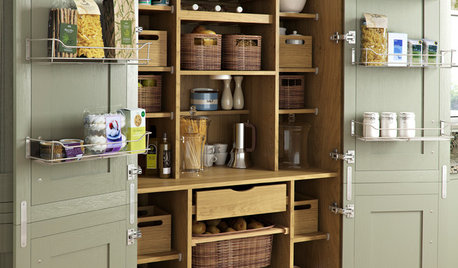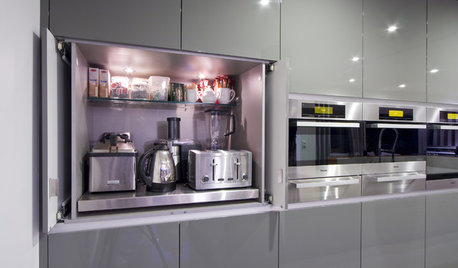Refrigerator Pickles
river22
15 years ago
Related Stories

GREEN BUILDINGHouzz Tour: Pickle Factory Now an Energy-Wise Live-Work Space
A charming but poorly insulated 1880s Philadelphia commercial building becomes a spacious energy-efficient home and studio
Full Story
WORKING WITH PROSInside Houzz: No More Bumper Cars in This Remodeled Kitchen
More space, more storage, and the dogs can stretch out now too. A designer found on Houzz creates a couple's just-right kitchen
Full Story
KITCHEN PANTRIES80 Pretty and Practical Kitchen Pantries
This collection of kitchen pantries covers a wide range of sizes, styles and budgets
Full Story
KITCHEN DESIGNThe Best Places to Stash Small Kitchen Appliances
Tucked-away places like nooks, pantries and dedicated cabinets keep your kitchen gadgets handy but out of the way
Full Story
SMALL KITCHENSHouzz Call: Show Us Your 100-Square-Foot Kitchen
Upload photos of your small space and tell us how you’ve handled storage, function, layout and more
Full Story
FUN HOUZZ10 Truly Irritating Things Your Partner Does in the Kitchen
Dirty dishes, food scraps in the sink — will the madness ever stop?
Full Story
KITCHEN WORKBOOKHow to Remodel Your Kitchen
Follow these start-to-finish steps to achieve a successful kitchen remodel
Full Story
KITCHEN DESIGNNot a Big Cook? These Fun Kitchen Ideas Are for You
Would you rather sip wine and read than cook every night? Consider these kitchen amenities
Full Story
KITCHEN DESIGN9 Ways to Save on Your Kitchen Remodel
A designer shares key areas where you can economize — and still get the kitchen of your dreams
Full Story
MOST POPULARHow to Reface Your Old Kitchen Cabinets
Find out what’s involved in updating your cabinets by refinishing or replacing doors and drawers
Full StoryMore Discussions






Linda_Lou
river22Original Author
Related Professionals
Arlington Landscape Architects & Landscape Designers · Barrington Hills Landscape Architects & Landscape Designers · Mountain Brook Landscape Architects & Landscape Designers · Redondo Beach Landscape Architects & Landscape Designers · Maple Heights Landscape Architects & Landscape Designers · Wakefield Landscape Contractors · Bell Gardens Landscape Contractors · Deerfield Landscape Contractors · Galt Landscape Contractors · Pleasant Hill Landscape Contractors · Seven Hills Landscape Contractors · Apex Roofing & Gutters · Rome Roofing & Gutters · Hicksville Roofing & Gutters · Damascus Roofing & Gutterskayskats
ksrogers
digdirt2
digdirt2